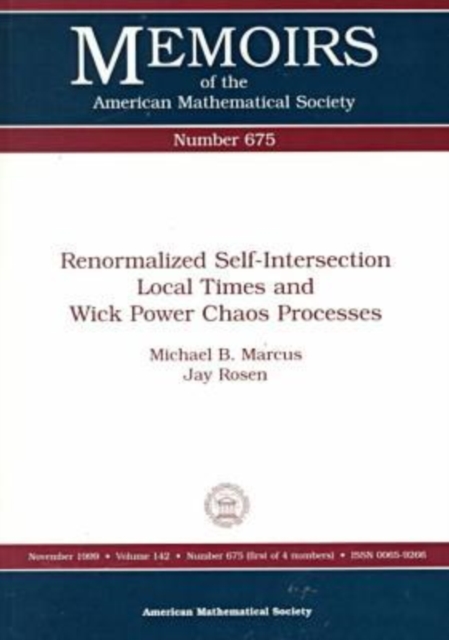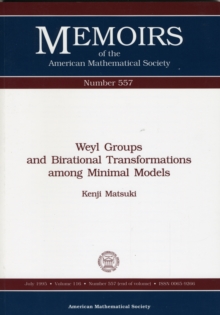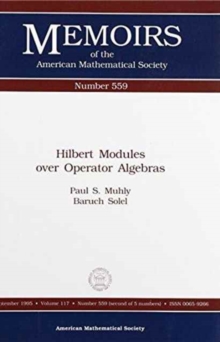
Renormalized Self-Intersection Local Times and Wick Power Chaos Processes Paperback / softback
Part of the Memoirs of the American Mathematical Society series
Paperback / softback
Description
Sufficient conditions are obtained for the continuity of renormalized self-intersection local times for the multiple intersections of a large class of strongly symmetric Levy processes in $R^m$, $m=1,2$.
In $R^2$ these include Brownian motion and stable processes of index greater than 3/2, as well as many processes in their domains of attraction.
In $R^1$ these include stable processes of index $3/4<\beta\le 1$ and many processes in their domains of attraction.Let $(\Omega, \mathcal F(t),X(t), P^{x})$ be one of these radially symmetric Levy processes with 1-potential density $u^1(x,y)$.
Let $\mathcal G^{2n}$ denote the class of positive finite measures $\mu$ on $R^m$ for which $\int\!\!\int (u^1(x,y))^{2n}\,d\mu(x)\,d\mu(y)<\infty$.
For $\mu\in\mathcal G^{2n}$, let $\alpha_{n,\epsilon}(\mu,\lambda) \overset\text{def}\to=\int\!\!\int_{\{0\leq t_1\leq \cdots \leq t_n\leq \lambda\}} f_{\epsilon}(X(t_1)-x)\prod_{j=2}^n f_{\epsilon}(X(t_j)- X(t_{j-1}))\,dt_1\cdots\,dt_n\,d\mu(x)$ where $f_{\epsilon}$ is an approximate $\delta-$function at zero and $\lambda$ is an random exponential time, with mean one, independent of $X$, with probability measure $P_\lambda$.The renormalized self-intersection local time of $X$ with respect to the measure $\mu$ is defined as $\gamma_{n}(\mu)=\lim_{\epsilon\to 0}\,\sum_{k=0}^{n-1}(-1)^{k} {n-1 \choose k}(u^1_{\epsilon}(0))^{k} \alpha_{n-k,\epsilon}(\mu,\lambda)$ where $u^1_{\epsilon}(x)\overset\text{def}\to= \int f_{\epsilon}(x-y)u^1(y)\,dy$, with $u^1(x)\overset\text{def} \to= u^1(x+z,z)$ for all $z\in R^m$.
Conditions are obtained under which this limit exists in $L^2(\Omega\times R^+,P^y_\lambda)$ for all $y\in R^m$, where $P^y_\lambda\overset\text{def}\to= P^y\times P_\lambda$.
Let $\{\mu_x,x\in R^m\}$ denote the set of translates of the measure $\mu$.The main result in this paper is a sufficient condition for the continuity of $\{\gamma_{n}(\mu_x),\,x\in R^m\}$ namely that this process is continuous $P^y_\lambda$ almost surely for all $y\in R^m$, if the corresponding 2$n$-th Wick power chaos process, $\{:G^{2n}\mu_x:,\,x\in R^m\}$ is continuous almost surely.
This chaos process is obtained in the following way.A Gaussian process $G_{x,\delta}$ is defined which has covariance $u^1_\delta(x,y)$, where $\lim_{\delta\to 0}u_\delta^1(x,y)=u^1(x,y)$.
Then $:G^{2n}\mu_x:\overset\text{def}\to= \lim_{\delta\to 0}\int:G_{y,\delta}^{2n}:\,d\mu_x(y)$ where the limit is taken in $L^2$. ($:G_{y,\delta}^{2n}:$ is the 2$n$-th Wick power of $G_{y,\delta}$, that is, a normalized Hermite polynomial of degree 2$n$ in $G_{y,\delta}$).
This process has a natural metric $d(x,y)\overset\text{def}\to= \frac1 {(2n)!}\(E(:G^{2n}\mu_x:-:G^{2n}\mu_y:)^2\)^{1/2} =\(\int\!\! \int \(u^1(u,v)\)^{2n} \left(d(\mu_x(u)-\mu_y(u)) \right) \left(d(\mu_x(v)-\mu_y(v)) \right)\)^{1/2}$.
A well known metric entropy condition with respect to $d$ gives a sufficient condition for the continuity of $\{:G^{2n}\mu_x:,\,x\in R^m\}$ and hence for $\{\gamma_{n}(\mu_x),\,x\in R^m\}$.
Information
-
Out of Stock - We are unable to provide an estimated availability date for this product
- Format:Paperback / softback
- Pages:bibliography
- Publisher:American Mathematical Society
- Publication Date:30/10/1999
- Category:
- ISBN:9780821813409
Other Formats
- PDF from £45.90
Information
-
Out of Stock - We are unable to provide an estimated availability date for this product
- Format:Paperback / softback
- Pages:bibliography
- Publisher:American Mathematical Society
- Publication Date:30/10/1999
- Category:
- ISBN:9780821813409









